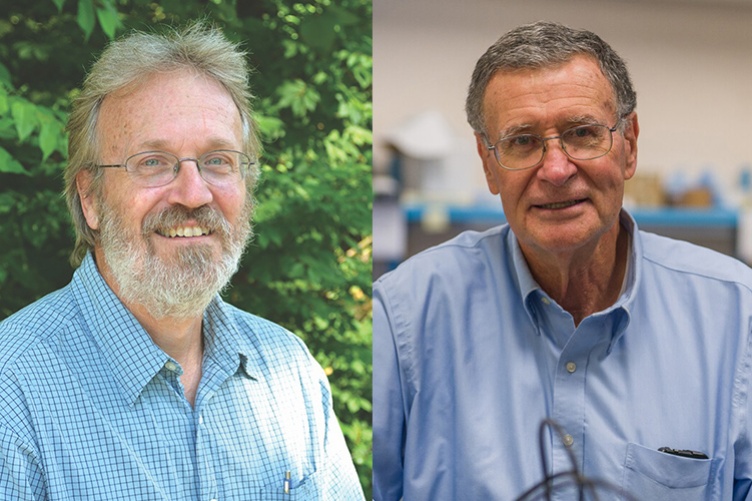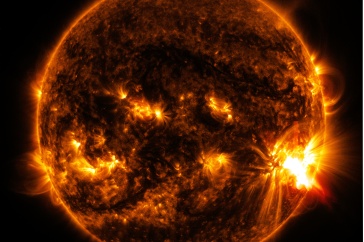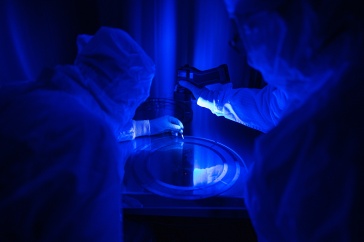
Two UNH researchers — Steve Frolking, a climate and Earth sciences expert, and space scientist Roy Torbert, who leads UNH’s efforts on the NASA MMS mission — have been elected to the 2021 Class of Fellows of the American Geophysical Union (AGU), a prestigious international award that honors exceptional scientific contributions to Earth and space sciences.
Frolking and Torbert are among the 59 international scientists who are recognized by AGU for work that has significantly advanced research in their fields. Each year, fewer than 0.1 percent of AGU members are bestowed this lifelong fellowship.
“We are incredibly pleased that Steve and Roy are being honored by the AGU for their top-notch research, and we congratulate them on receiving this well-deserved distinction,” says Marian McCord, senior vice provost for research, economic engagement and outreach at UNH. “Their dedication to their fields of study and to mentoring the next generation of scientists places them among the very best in the world, and we are honored to work with both of them here at UNH."
Frolking and Torbert are both part of the UNH College of Engineering and Physical Sciences as well as the UNH Institute for the Study of Earth, Oceans and Space (EOS). Harlan Spence, the Director for EOS, echoed McCord's congratulations and lauded Frolking and Torbert for their work in climate change modeling and space plasma physics, respectively. "For many decades, their consistently outstanding scholarship has contributed to the Institute's stature as an international leader in Earth systems science and space science," Spence says.

Frolking, a research professor in the Department of Earth Sciences and the Earth Systems Research Center, is a triple alum of UNH: BS ’80 (physics), MS ’83 (physics), Ph.D. ’93 (Earth Science). His research focuses on ecosystem interactions with the Earth’s climate system and human modifications of these systems, with a primary emphasis on modeling the carbon balance of peatlands at seasonal to millennial time scales. He has also worked extensively on simulating greenhouse gas emissions from the world’s agricultural systems, regional- to global-scale hydrological and water resource modeling, and remote sensing analysis of global urban growth. Frolking served as chair of UNH’s Natural Resources and Earth System Science Ph.D. Program from 2015 to 2021 and was the director of the Earth Systems Research Center from 2006 to 2009. In addition, he was named a fellow of the American Association for the Advancement of Science (AAAS) in 2015 and was a Fulbright Fellow in Finland in 2018.
“My research is always collaborative and I have been fortunate to have had excellent colleagues at UNH and around the world over the past 40 years,” Frolking says. “I particularly thank my Ph.D. advisor, Robert Harriss, who showed by example that everything is interesting, and that there are important earth system science questions wherever you happen to look.”

Torbert has been a faculty member in the UNH Physics Department and the Space Science Center since 1989. He recently retired from teaching, but continues to mentor graduate and undergraduate students. He has a long research record in the area of heliophysics — the study of the sun and its interactions with the solar system and space weather — where he has led sounding rocket missions and satellite instruments in auroral, substorm and magnetic reconnection investigations in the near-Earth space. In addition to his involvement in the MMS mission, Torbert has been a co-investigator on numerous NASA missions, including Cluster, Van Allan Probes, Equator-S, Wind, and Polar projects, as well as the recent Space Weather Follow-On Lagrange 1 satellite.
He served as dean of the College of Engineering and Physics Sciences from 1995 to 2000, director of the Space Science Center from 2000 to 2009 and 2010 to 2013, and interim director of the Institute for Study of Earth, Oceans, and Space from 2009 to 2010. He also served as the first director of the Southwest Research Institute department of EOS, which is a partnership with UNH.
“My interest in the physics of space plasmas was nurtured by my interactions with many students at UNH and elsewhere and by distinguished members of the space science field, most notably professor Roger Arnoldy here at UNH, professors Forrest Mozer, Kinsey Anderson and Dr. Charles Carlson at Berkeley, professors Gerhard Haerendel and Goetz Paschmann at the Max Planck Institute and Dr. James Burch at the Southwest Research Institute,” Torbert, who also credited the many engineers and technicians he worked with at the Space Science Center, says. "It is a particular pleasure to serve under my former student, professor Craig Kletzing, at the University of Iowa, who now leads a major new NASA mission.”
The Institute for the Study of Earth, Oceans, and Space (EOS) is UNH's largest research enterprise, comprising six centers with a focus on interdisciplinary, high-impact research on Earth and climate systems, space science, the marine environment, seafloor mapping and environmental acoustics. With more than $60 million in external funding secured annually, EOS fosters an intellectual and scientific environment that advances visionary scholarship and leadership in world-class research and graduate education.
-
Written By:
Rebecca Irelan | Institute for the Study of Earth, Oceans, and Space | rebecca.irelan@unh.edu | 603-862-0990



















































